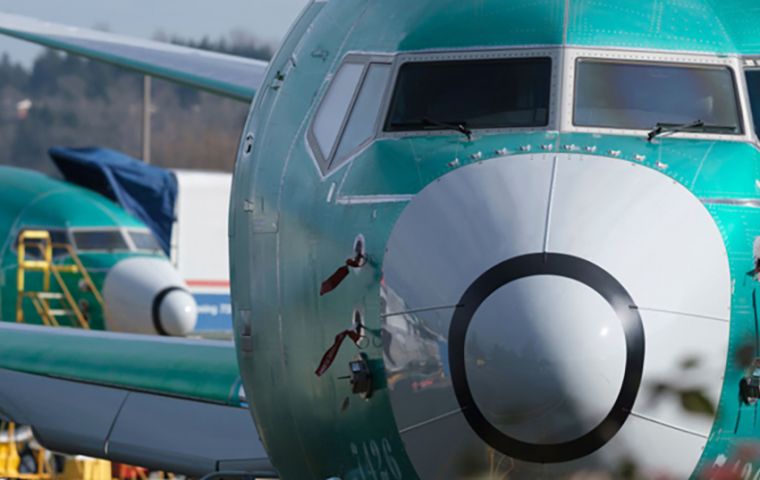MercoPress. South Atlantic News Agency
Boeing admits the anti-stall system was a factor in the crash of Ethiopian Flight
 Despite their efforts, pilots “were not able to control the aircraft”, Transport Minister Dagmawit Moges said. It was the second crash of a Boeing 737 Max
Despite their efforts, pilots “were not able to control the aircraft”, Transport Minister Dagmawit Moges said. It was the second crash of a Boeing 737 Max The Ethiopian Airlines plane that crashed last month nosedived several times before it hit the ground, a preliminary report has said. Pilots “repeatedly” followed procedures recommended by Boeing before the crash, according to the first official report.
Boeing's boss has admitted for the first time a failure in the jet's anti-stall system was a factor in the crash. Flight ET302 crashed after take-off from Addis Ababa, killing 157 people.
Despite their efforts, pilots “were not able to control the aircraft”, Transport Minister Dagmawit Moges said. It was the second crash of a Boeing 737 Max aircraft in five months.
Last October, Lion Air flight JT 610 crashed into the sea near Indonesia killing all 189 people on board.
In a news conference in Addis Ababa, Ms Dagmawit said: “The crew performed all the procedures repeatedly [that were] provided by the manufacturer but were not able to control the aircraft.”
The 737 Max family of aircraft was grounded following the Ethiopian Airlines crash, a move affecting more than 300 planes.
The preliminary report did not attribute blame for the crash. But it says the crew were fully qualified to conduct the flight, and that they performed all the expected procedures correctly.
The report goes on to recommend that Boeing review the 737 Max's “flight control system related to flight controllability” and that aviation regulators ensure this is done before the aircraft goes back into the air.
Crash investigators have focused their attention on the Manoeuvring Characteristics Augmentation System (MCAS) - software designed to help prevent the 737 Max from stalling.
The software reacts when sensors in the nose of the aircraft show the jet is climbing at too steep an angle, which can cause a plane to stall.
The report does not mention the MCAS by name, but it does detail during the minutes after takeoff the problems the pilots were having in trying to control the aircraft's angle of flight.
At one point the captain called out three times “pull up”, and seconds after instructed the first officer to tell Air Traffic Control that they had a flight control problem.
In a statement on Thursday, the chief executive of Ethiopian Airlines, Tewolde GebreMariam, said he was “very proud” of the pilots' “high level of professional performance”.
“It was very unfortunate they could not recover the airplane from the persistence of nosediving,” the airline said in a statement.
In a statement on Thursday, Boeing's chairman and chief executive Dennis Muilenburg said that following the release of the report it was “apparent” that in both flights, the MCAS software was “activated in response to erroneous angle of attack information”.
He added: “As pilots have told us, erroneous activation of the MCAS function can add to what is already a high workload environment. It's our responsibility to eliminate this risk. We own it and we know how to do it.”
Earlier, Boeing said in a statement: “To ensure unintended MCAS activation will not occur again, Boeing has developed and is planning to release a software update to MCAS and an associated comprehensive pilot training and supplementary education program for the 737 MAX.”
The company said the update “adds additional layers of protection and will prevent erroneous data from causing MCAS activation. Flight crews will always have the ability to override MCAS and manually control the airplane”.
Boeing has issued guidance to pilots on how to manage MCAS, and it plans to install an extra warning system on all 737 Max aircraft, which was previously an optional safety feature.
It is also revising pilot training to provide “enhanced understanding of the 737 Max” flight system and crew procedures. The plane-maker says the upgrades are not an admission that MCAS caused the crashes.




Top Comments
Disclaimer & comment rulesCommenting for this story is now closed.
If you have a Facebook account, become a fan and comment on our Facebook Page!